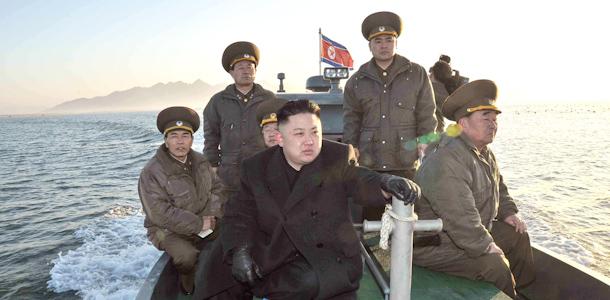North Korea threatens warfare, impacts Korean international students
A photo released by KCNA news agency on March 12, 2013, shows North Korea leader Kim Jong Un visiting the Wolnae-do Defence Detachment on the western front line. (KCNA/Xinhua/Zuma Press/MCT)
The North Korean Missile Crisis has begun.
On March 7, North Korea threatened to attack the United States with nuclear weapons. Since then, North Korea has been continuing to make similar threats against the United States, Japan, and South Korea. While most analysts agree that North Korea does not have the capability to hit the United States with a missile, they concur that some of its missiles could hit South Korea or Japan, where American forces are stationed.
North Korea is threatening the United States and South Korea, an ally of the United States, because the United States led the charge in the United Nations for more sanctions to punish North Korea for its nuclear test in February.
Many analysts believe that North Korea’s main goal in threatening the United States and South Korea is to get aid and other concessions. Other analysts believe that North Korea wants to be recognized as a nuclear state. And some analysts believe that North Korea is actually afraid of an attack from the United States.
Senior Hyunjin Iris Kim, who is originally from Geoje, South Korea traveled home to South Korea over spring break for her senior project: writing a tour guide book about South Korea. She agrees with the analysts who believe that North Korea is looking for aid. “I guess everyone knows pretty well that all North Korea needs is attention or financial aids or both,” Kim said.
If a missile test or attack actually occurs, the United States and South Korea might deal with it in a few ways. Experts believe that if a missile attack went into the water, the United States and South Korea would ignore it, but if a missile attack headed towards land, the United States would shoot it down or intercept it. If a more direct attack occurs, the United States and South Korea would most likely strike back.
Sophomore Hye Grace Lee is from South Korea and her family still lives there. In Lee’s opinion, North Korea will not attack the United States because they are unable to, but they could attack South Korea to “show off their power.”
“I am worried about my family who lives 20 minutes away from Seoul,” Lee said. “Kim Jung Il and his ancestors have been threatening South Korea for a long time, but I think it is time for South Korea to prepare and be ready for a sudden war. Don’t underestimate North Korea and just be prepared for some kind of possibility.”
China, an ally of North Korea, supplies North Korea with food and other basic necessities, but North Koreans still suffer from hunger and malnutrition. According to the United Nations Office for the Coordination of Humanitarian Affairs, over one-fourth of all North Korean children are stunted from chronic malnutrition and two-thirds of the country’s 24 million people struggle to find food every day.
According to Amnesty International, North Koreans suffer from “extreme forms of repression and human rights violations.” North Koreans are not allowed to speak out against their government, are shielded from the rest of the world, and are subject to arbitrary arrest – arrest when there is no evidence or likelihood that he or she committed a crime.
North Korea also has many political prison camps, which hold more than 200,000 prisoners, according to human rights organizations. In the camps, prisoners are tortured and treated inhumanely. Many prisoners are raped, used for slave labor, and executed. Because North Koreans are shielded from the rest of the world, they do not see the crimes against them committed by their government as wrong.
“[South Koreans] are familiar with the situations going on right now as [North Korea] does crazy things often,” Kim said. “[South Korea and North Korea] have been in a truce since 1953, so troops are ready all the time just in case of [the] North’s unexpected movements. It is true that we have our fingers crossed, but we think North is not going to take an action.”
Mary Kate Luft is an A&E Editor for the Patriot and jcpatriot.com.














